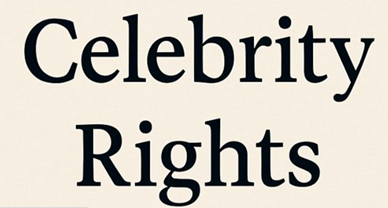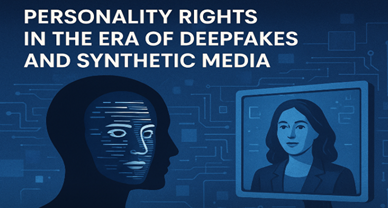Protection of Celebrity Rights in India
There is a recent trend, on social media platforms like Instagram, YouTube and tick-tok , where dermatologist and cosmetic doctors on their official social media page, who are no less than an influencers- having huge following, posts content titled, “the before and after” or “the breakdown of celebrities surgery history.” The beginning of this trend was believed to be for educational purposes which soon gained great following from normal viewers, then it gradually shifted towards creating awareness amongst the common man, to reduce their insecurities and to normalise the concept of cosmetic procedures. The videos usually begins with a photo of a celebrity where in they do not look good according to the “societal norms” and then a transition is done to their most recent photos where in they look aesthetically different. The doctors then dwell into mentioning that the celebrity has done either Botox, lip fillers, nose jobs, or surgical facelifts. Though this content may appear harmless in the start, in an era of immense obsession regarding celebrities, this raises a significant concerns on medical ethical grounds, privacy laws and overall the media and entertainment legal framework in our country. In the beginning, such content was posted with a clear intention to help common people understand that the perfect visuals the celebrities claim are not natural, specially to reduce or regulate the body image concerns amongst the youth.
However, with increase and popularisation of the trend, the taglines of the content changed all together: from informational or awareness videos, the content started focusing on before and after pictures with captions like “shocking transformation” or “surgeries done by xyz celebrity”. The photos that shows the before are always pre- puberty photos and the post photos are ones that are done in professional setting with professional lighting, makeup and a post puberty version; which also raises the doubts of the speculations being untrue for the very part of the content.
Another significant observation is that, such content is almost always targeting women celebrity- models, actresses and other female influencers. This not only raises social and moral issues but also legal ones, according to Indian Medical Council (professional conduct, etiquette and ethics) regulations, 2002, medical professionals must restraint from such acts and must advocate dignity, confidentiality and integrity; not only for their personal patients but even outside their professional relationships.
Regulation 1.1.2, which talks about the primary goal of medical professionals being to serve humanity and is required to align with this aim. It further mentions professionals to be pure in character and diligent towards patients.
Regulation 7.14 also states that registered medical practitioner shall not disclose the personal information obtained by them during the course of their professional transaction. It also states exceptions – i) in a court of law under orders of the Presiding Judge; in circumstances where there is a serious and identified risk to a specific person and / or community; and ii) notifiable diseases. In case of communicable / notifiable diseases, concerned public health authorities should be informed immediately. The celebrities might not be the patients of the doctors but a public diagnoses or discussion of their medical history, based on photographs and mere assumptions is unethical, unprofessional and violative of the dignity of the individual.
The renowned case of Justice K.S. Puttaswamy (Retd.) v. Union of India (2017) in the landmark judgement stated that right to privacy is to be considered as a fundamental right of an individuals under Article 21 of the Constitution of India. The content that publicly discussed about an individual’s medical or surgical history, is a violation of their fundamental rights. Such information regarding someone’s personal life is not of public interest and doing so without a valid consent is illegal and even a moral wrong.
In the case of, ICC Development v. Arvee Enterprises (2003), the Delhi High Court ruled that even if the name or image of a celebrity is public, using it without consent for commercial gain amounts to misappropriation. Such medical practitioners and doctors, using a celebrity name and images to attract attention in the firm of views, likes and even potential clients- all this is done for personal gains on the stake of violation of an individual’s rights.
One of the most problematic part of this trend is the target mostly being the female celebrities. Very few of these videos dissect male celebrity’s cosmetic history. The judgments and scrutiny is always open for the women celebrity, implying their body is public property. As professionals of medical fields, they should be well aware of the fact that such content not only affects the reputation of an individual but also has significant impact on psychological and social factors.
Does the celebrity have the right to sue?
The answer is yes, under the provisions of tort law: defamation and misrepresentation, violation of right to privacy are strong grounds for filing suits. Recently actress Aishwarya Rai Bachan and actor Abhishek Bachan, moved to Delhi High Court against unauthorised use of her name, seeking protection of her personality rights. Followed by various famous personality like film maker Karan Johar against content that tarnishes his good will and reputation affecting his brand value.
How can a change be brought?
Such content should clearly state or give a disclaimer that, the medical content is an opinion and not the actual reality, and any content infringing these rights should be reported from such social media platforms.
On the other part, stricter regulation and guidelines should be introduced for such contents, to prevent the medical professionals from creating such content for views. Having a fist hand Experience of such unethical defamation and bullying earlier at schools, I personally suggest steps to be taken on individual level, blindly believing baseless information about any person, even though if it comes from verified medical practitioners should not be encouraged.
As a law student, I see an urgent need to draw a line between public interest and invasion of someone’s privacy . Consent should not be viewed as inessential, it is the foundation. This is a bigger issue specially in the era we live in, where everyone has access to unlimited information and people trying their best to get fame on such platforms for personal gains.
Author:– SANIKA BODKE, in case of any queries please contact/write back to us at support@ipandlegalfilings.com or IP & Legal Filing.



